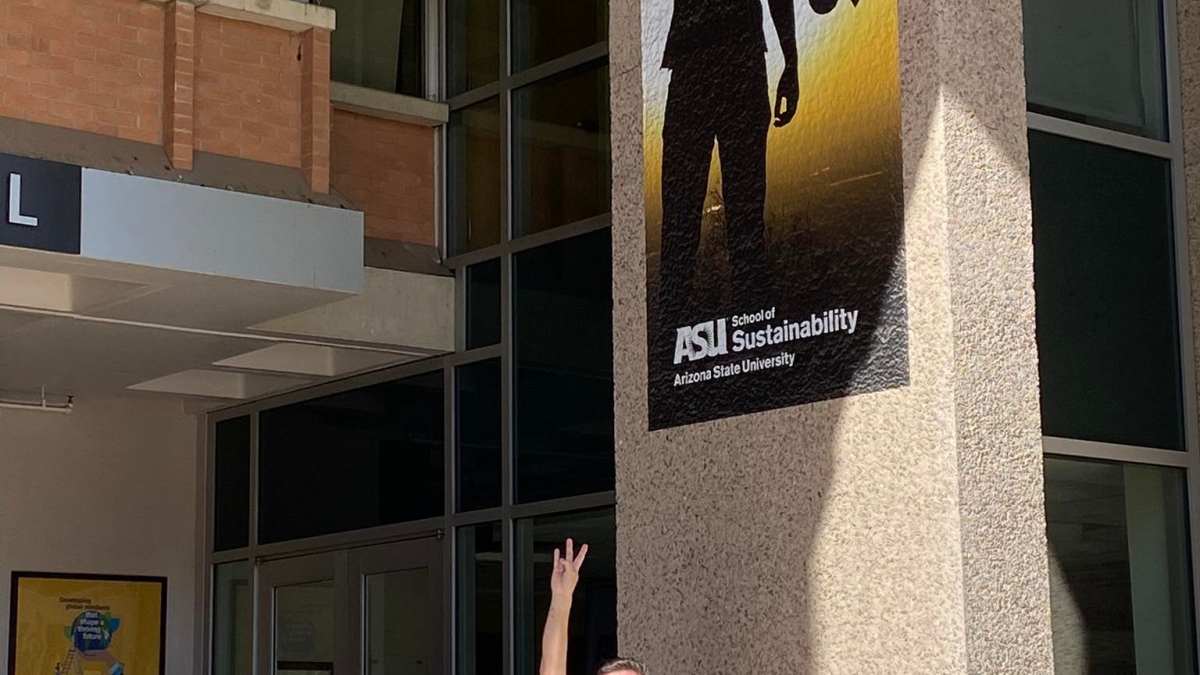Visiting scholar at ASU is selected for Open Society Institute’s 2021 Civil Society Scholar Award

Visiting scholar Zeqir Veselaj's current project is an online ecological footprint calculator, a tool for Kosovar educators to teach their students about resource conservation and the environment. Photo by Drita Halitaj
The Melikian Center for Russian, Eurasian and East European Studies at Arizona State University welcomed Zeqir Veselaj as a visiting scholar this past November. Veselaj, a professor of environmental education and sustainable development in the Faculty of Education at the University of Pristina, Kosovo, was previously a Fulbright Scholar at ASU in 2018.
Alongside his academic work, he has led a distinguished career in public service. Veselaj served as director of the Institute for Nature and Environmental Protection of Kosovo, as well as the environmental adviser of the first minister of environment of Kosovo.
Veselaj’s most recent stint at ASU was made possible by a 2021 Civil Society Scholar Award from Open Society Foundations for his current project SUSKOS, an online ecological footprint calculator. This ecological calculator is a tool for Kosovar educators to teach their students about resource conservation and the environment.
While at ASU, Veselaj collaborated with Shahin H. Berisha, a retired faculty member of GateWay Community College and an adjunct professor and advisory board member of the Melikian Center.
ASU News spoke with Veselaj recently about environmental education, public service and what he learned from working with ASU.
Question: This isn’t your first time as a visiting scholar to ASU. What value does international collaboration add to your project?
Answer: It is my third time at ASU as a visiting researcher, but my second direct collaboration with Professor Berisha. In fact, his presentations on the ecological footprint in 2017 was our first contact. He was then working on a five-year Transformational Leadership Program sponsored by the USAID and the government of Kosovo. Through this program, he and Emeritus Professor Stephen Batalden supported the establishment of the Center for Energy and Sustainability (CEC) within the University of Pristina, the first interdisciplinary unit there. This project was a continuation of the long-term partnership between our two universities. From 2019–2020, I completed a project with the ASU Biodesign Institute to develop an online training for teachers on integrating sustainability issues in a classroom environment.
Q: Through your footprint calculator, you hope to seed awareness of the importance of the environment and natural resource conservation among young students in Kosovo. What would the ideal outcome of this environmental education project be? What actions do you hope to inspire?
A: Through a pilot survey research project I conducted with Berisha, I found that the concepts of ecological footprint, water footprint and carbon footprint are not well known in Kosovo. Often people see environmental problems as "something out there" that they have no responsibility for. With the ecological footprint calculator, our goal is to bring the idea of responsibility for environment and natural resources at the individual level to Kosovo. This is tied to our individual demand from nature (resources such as food, water, energy) and how much pressure we put on the environment through the waste and the CO2 we generate through our activities.
When my students calculate their individual footprint, they are often ashamed of their environmental impact. With this tool, we hope people will try to change their lifestyle in terms of wiser use of natural resources and waste generation. Kosovo’s ecological footprint is above the global average of 2.8 global hectares (gha) per person. With a pilot group of students, the average footprint was 3.93 gha. As part of the project, we developed an online calculator in the Albanian language. The project has been presented on the national broadcaster and radio as part of the public awareness campaign.
Q: You have held government positions in Kosovo, such as the environmental adviser of the first minister of environment; you are a professor at the University of Pristina; and now your SUSKOS project is aimed at teachers and students. Do you see a distinction in your responsibilities and how you approach your work in these different roles?
A: Whether as a government official, a member of civil society or a researcher, my life mission is to improve the environmental situation of my post-war country, the Republic of Kosovo. Kosovo, in addition to being the youngest country in Europe, also has the youngest population on the continent. In this sense our target is the younger generation, those who can change their attitudes towards the environment.
In principle, the general idea of SUSKOS was to raise the ecological awareness of Kosovars and lead them towards communal responsibility. The best option for this is to introduce sustainability footprints in the education system. This is the main goal of the SUSKOS project: working with future teachers and current teachers in all pre-university levels in Kosovo. If they understand their impact on the environment and how big it is, then the attitudes behind it are expected to change.
I am very honored to be a Kosovo researcher who is supported in this project by the Civil Society Research Award. It allowed me to continue my cooperation with ASU, as a leading university in the field of innovation. Having Professor Berisha as a project partner made the implementation of the project activities go very well. The workshops we held with students, teachers and civil society representatives generated great interest in Kosovar media.
Written by Kristen Ho
More Environment and sustainability

ASU prof turns trash into treasure
The Research Corporation for Science Advancement, or RCSA, regularly hosts a series of discussions known as Scialog, a…

Best outdoor experiences are shared and build connections, recreation professor says
Steve Sassaman doesn’t really need to tell you he’s an outdoorsman. One look at his full, dark beard gives a vibe that clearly…

ASU offers new project-based courses for global leaders of tomorrow
Addressing complex challenges requires innovative solutions.This is why the College of Global Futures — with its four academic…